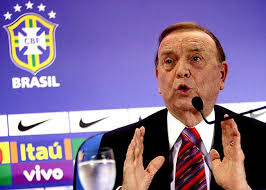By Mark Baber
April 4 – Congressman Romario has been stepping up his attacks on Brazilian Football Confederation (CBF) president Jose Maria Marin (pictured) over his alleged links to the country’s former military dictatorship.
On Monday, Romario, who led Brazil to the 1994 World Cup title, and is now Chairman of the Chamber of Tourism and Sports presented a petition to the CBF demanding the sacking of Marin. The petition with over 50,000 signatures was delivered by Romario and Ivo Herzog, the son of a local journalist who died during the dictatorship era in 1975, on the basis that Marin helped give political support to the military regime.
In recent months the 80-year old Marin has faced increasing pressure from activists. He was a deputy state of São Paulo of political party Arena, who supported the military government between 1971 and 1979. In 1975, in a speech in the Legislative Assembly, he urged authorities to take “action” against the journalist Vladimir Herzog, then director of TV Cultura.
Two weeks later, Herzog was arrested and murdered by the regime in prison. A year after the incident, Marin returned to the parliamentary tribune to praise the performance of then delegate DOPS (Department of Political and Social Order) Paranhos Sérgio Fleury, who has been accused of several cases of torture, including that which caused the death of Herzog.
For his part, Marin has denied any wrongdoing, saying to the CBF website: “Anyone with good faith will easily conclude that the accusations by these pseudo-journalists are absolutely false. It’s a campaign based on lies.”
Romario’s campaign looks set to continue, with a hearing soon at the National Truth Commission, set up to investigate human rights crimes committed during the military dictatorship, as he regards Marin as “a person suspected of involvement, albeit indirect, with torture, murder and suppression of democracy.”
Rosa Maria Cardoso da Cunha, a professor at UFF (Universidade Federal Fluminense) and one of seven members of the National Truth Commission has said that “from the information we have, he was not as active,” and his support for the regime and repression was “episodic”. He was a “silent deputy”.
Contact the writer of this story at moc.l1738730448labto1738730448ofdlr1738730448owedi1738730448sni@r1738730448ebab.1738730448kram1738730448

